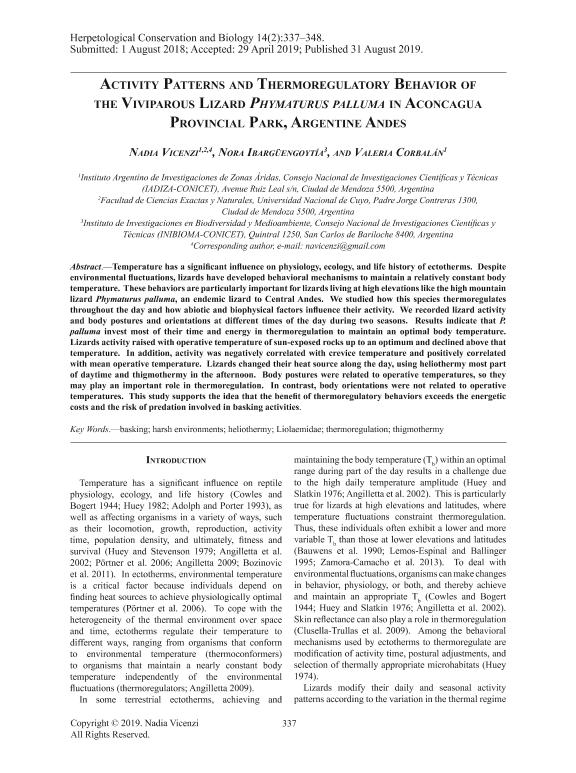Artículo
Activity Patterns and Thermoregulatory Behavior of the Viviparous Lizard Phymaturus palluma in Aconcagua Provincial Park, Argentine Andes
Fecha de publicación:
08/2019
Editorial:
Herpetological Conservation and Biology
Revista:
Herpetological Conservation and Biology
ISSN:
2151-0733
e-ISSN:
1931-7603
Idioma:
Inglés
Tipo de recurso:
Artículo publicado
Clasificación temática:
Resumen
Temperature has a significant influence on physiology, ecology, and life history of ectotherms. Despite environmental fluctuations, lizards have developed behavioral mechanisms to maintain a relatively constant body temperature. These behaviors are particularly important for lizards living at high elevations like the high mountain lizard Phymaturus palluma, an endemic lizard to Central Andes. We studied how this species thermoregulates throughout the day and how abiotic and biophysical factors influence their activity. We recorded lizard activity and body postures and orientations at different times of the day during two seasons. Results indicate that P. palluma invest most of their time and energy in thermoregulation to maintain an optimal body temperature. Lizards activity raised with operative temperature of sun-exposed rocks up to an optimum and declined above that temperature. In addition, activity was negatively correlated with crevice temperature and positively correlated with mean operative temperature. Lizards changed their heat source along the day, using heliothermy most part of daytime and thigmothermy in the afternoon. Body postures were related to operative temperatures, so they may play an important role in thermoregulation. In contrast, body orientations were not related to operative temperatures. This study supports the idea that the benefit of thermoregulatory behaviors exceeds the energetic costs and the risk of predation involved in basking activities.
Archivos asociados
Licencia
Identificadores
Colecciones
Articulos(IADIZA)
Articulos de INST. ARG DE INVEST. DE LAS ZONAS ARIDAS
Articulos de INST. ARG DE INVEST. DE LAS ZONAS ARIDAS
Articulos(INIBIOMA)
Articulos de INST. DE INVEST.EN BIODIVERSIDAD Y MEDIOAMBIENTE
Articulos de INST. DE INVEST.EN BIODIVERSIDAD Y MEDIOAMBIENTE
Citación
Vicenzi, Nadia Pamela; Ibarguengoytía, Nora; Corbalán, Valeria Elizabeth; Activity Patterns and Thermoregulatory Behavior of the Viviparous Lizard Phymaturus palluma in Aconcagua Provincial Park, Argentine Andes; Herpetological Conservation and Biology; Herpetological Conservation and Biology; 14; 2; 8-2019; 337-348
Compartir




